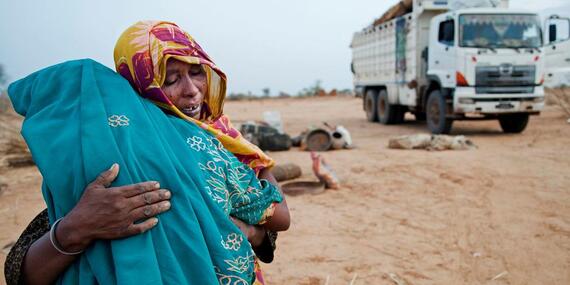Today's top news: Occupied Palestinian Territory, Sudan, Bangladesh

Occupied Palestinian Territory
The Under-Secretary-General, Martin Griffiths, said the images of death and devastation following Israel’s military operation in the Nuseirat refugee camp on Saturday prove that each day the war continues, it only grows more horrific.
In a social media post, Griffiths said Nuseirat was the epicentre of the seismic trauma that civilians continue to suffer in Gaza, where no one is safe and health care is hanging by a thread.
He called for all hostages to be released now and all civilians to be protected, saying this collective agony can and must end now.
OCHA reports that the Israeli military operation in the Nuseirat refugee camp overwhelmed the already limited capacity of hospitals, especially Al Aqsa and Al Awda in Deir al Baleh and the Nasser Medical Complex in Khan Younis.
A UN inter-agency mission to Al Aqsa hospital on Saturday found that the facility was hosting about 700 patients – nearly five times its capacity for in-patient services. Just one generator at the hospital is still running.
Fuel is also in critically short supply in Gaza. Colleagues working on water, sanitation and hygiene report that just 20 per cent of the fuel needed for vital water and wastewater facilities was received during the week of 26 May. These shortages, compounded by power cuts and damage to infrastructure, are severely disrupting operations and limiting people's access to water. As of 2 June, daily water production stood at just 26 per cent of pre-conflict levels.
The United Nations Relief and Works Agency for Palestine Refugees in the Near East say many displaced families in Gaza are forced to rely on dirty sea water for their daily needs. The increasing heat and lack of hygiene are making an already dire situation even worse.
More than 330,000 tons of solid waste have accumulated in or near populated areas across Gaza. In recent months, the UN Development Programme (UNDP) has collected tens of thousands of tons of waste from Deir al Balah, Khan Younis and Rafah and transferred it to temporary dumps – however, UNDP says these sites need key upgrades and additional funding is needed for response efforts.
Sudan
The Under-Secretary-General for Humanitarian Affairs, Martin Griffiths, said he is horrified by the news of the RSF attack on South Hospital in Al Fasher, Sudan, on Saturday.
Médecins Sans Frontières reported that members of the Rapid Support Forces stormed the facility, opened fire and looted it, including stealing an MSF ambulance. The UN has been unable to verify the number of casualties.
In a social media post, Griffiths said the escalating violence in Al Fasher is dealing a crushing blow to civilians at their most vulnerable – and stressed that the fighting, looting and atrocities we are seeing in Sudan over and over again must stop now.
At the time of the attack, there were 10 patients and a reduced medical team at the hospital, as MSF and Ministry of Health teams had started transferring patients and medical services to other facilities earlier in the week due to escalating fighting. MSF said that between May 25th and June 3rd, mortar shells and bullets directly hit South Hospital three times, killing two people and wounding 14 patients and caretakers.
South Hospital remains closed following the attack. It was one of only two facilities in Al Fasher with surgical capacity. It also served as the main referral hospital for treating war-wounded in the city, as the only facility equipped to manage mass casualties. Between 10 May and 6 June, more than 1,300 casualties sought treatment at South Hospital.
The World Health Organization in Sudan also expressed shock at the news of another attack on a health facility in Wad Al-Nura in Aj Jazirah State, that led to the death of a nurse while on duty and attending to patients.
OCHA underscores that under international humanitarian law, medical facilities, personnel and equipment must be protected against attack, looting and other forms of violence. The wounded and sick must also be protected and receive the care they need.
Bangladesh
The humanitarian community in Bangladesh launched a plan yesterday calling for urgent assistance to support the ongoing Government response to Cyclone Remal, which made landfall in southern Bangladesh just over two weeks ago.
The US$53 million appeal aims to reach 784,000 people affected by the storm, prioritizing the most vulnerable in need of immediate support, including food, water, nutrition, medicine, health care, protection, and agriculture and livelihood assistance.
Cyclone Remal displaced some 800,000 people within hours and affected some 4.6 million people overall, according to preliminary figures from the Government and assessments by the humanitarian community. In eight districts, nearly 434,000 people need health services.
Early action – including early warnings by authorities and volunteers – saved lives, but the destruction remains enormous. Many people are still living in shelters or with relatives after the cyclone damaged or destroyed nearly 174,000 homes. More than half a million farmers saw their crops were damaged, and children are unable to attend the nearly 1,000 Government primary schools that were damaged. The cyclone also damaged or destroyed more than 20,000 water points and 134,000 latrines.
Earlier this month, Emergency Relief Coordinator Martin Griffiths allocated $7.5 million from the Central Emergency Response Fund to support the humanitarian response to the cyclone.
